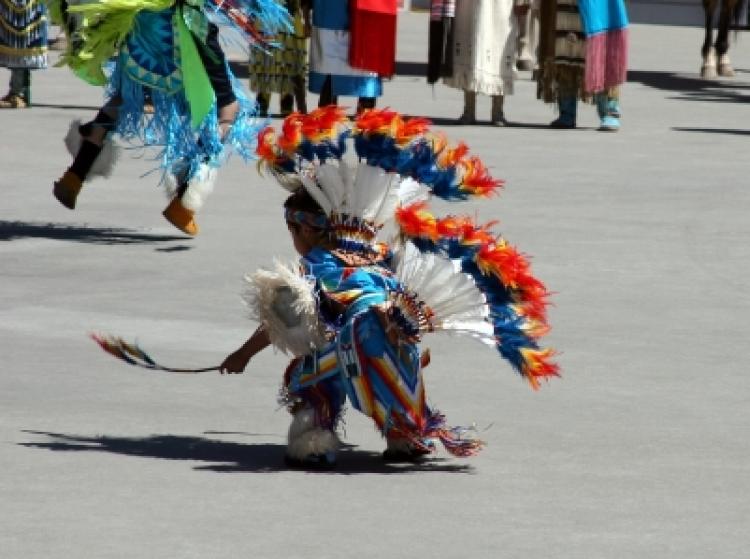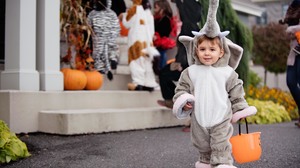
Saturn and Moon Meet in the Sky
Saturn and the Moon will meet up in the night sky for a close approach on November 10–11.
Canada’s National Indigenous Peoples Day, formerly called National Aboriginal Day, is annually held on June 21 to celebrate the unique heritage, diverse cultures, and outstanding achievements of the nation’s Aboriginal peoples. There are three Aboriginal groups in Canada – the First Nations, Inuit, and Métis peoples.

Traditional dancing, music, and festivals are part of the National Indigenous Peoples Day celebrations in Canada.
©iStockphoto.com/zennie
Canada’s National Indigenous Peoples Day gives many people the chance to learn more about Aboriginal people and their contributions towards the country’s development and progress. First Nations, Métis, and Inuit people have the opportunity to showcase their cultures and achievements throughout Canada on this day.
National Indigenous Peoples Day events are held in every region across Canada. Activities and events include (but are not limited to):
National Indigenous Peoples Day in Canada gives people of all walks of life the opportunity to celebrate and share knowledge about the Aboriginal peoples’ values, customs, languages, and culture.
National Indigenous Peoples Day is a paid holiday for employees in the Yukon Territory and the Northwest Territories, except those in the Northwest Territories Teachers' Association (NWTTA). It is not a statutory holiday in other parts of Canada. Traffic and parking conditions may be affected in areas where there are large celebrations to commemorate the day.
The Canadian Constitution recognizes three groups of Aboriginal peoples: Indians (First Nations), Inuit, and Métis. Although these groups share many similarities, they each have their own distinct heritage, language, cultural practices, and spiritual beliefs.
Many people have pushed for a national day to recognize and celebrate Canada’s Aboriginal peoples and cultures prior to 1996. For example, in 1982, the National Indian Brotherhood (now the Assembly of First Nations) called for June 21 to be National Aboriginal Solidarity Day. In 1995, the Royal Commission on Aboriginal Peoples recommended a National First Peoples Day to be designated. The Sacred Assembly, a national conference of Aboriginal and non-Aboriginal people, called for a national holiday to celebrate the contributions of Aboriginal peoples.
Canada’s governor general proclaimed the first National Aboriginal Day in 1996. In cooperation with Aboriginal organizations, the Canadian government chose June 21 for National Aboriginal Day because it was on or near the June solstice. Many of Canada’s Aboriginal peoples have celebrated their culture and heritage on or near this day for many generations. The event provides an opportunity to acknowledge the unique achievements of First Nations, Métis, and Inuit in fields as diverse as agriculture, the environment, business, and the arts.
In 2018, the day was officially renamed from National Aboriginal Day to National Indigenous Peoples Day.
Note: Any mention of summer in this article refers to summer in the northern hemisphere. Moreover, timeanddate.com wishes to thank Indian and Northern Affairs Canada for the background information regarding National Indigenous Peoples Day.
| Year | Weekday | Date | Name | Holiday Type | Area |
|---|---|---|---|---|---|
| 2019 | Fri | Jun 21 | National Indigenous Peoples Day | Observance | |
| 2019 | Fri | Jun 21 | National Indigenous Peoples Day | Local holiday | Northwest Territories, Yukon |
| 2020 | Sun | Jun 21 | National Indigenous Peoples Day | Observance | |
| 2020 | Sun | Jun 21 | National Indigenous Peoples Day | Local holiday | Northwest Territories, Yukon |
| 2021 | Mon | Jun 21 | National Indigenous Peoples Day | Observance | |
| 2021 | Mon | Jun 21 | National Indigenous Peoples Day | Local holiday | Northwest Territories, Yukon |
| 2022 | Tue | Jun 21 | National Indigenous Peoples Day | Observance | |
| 2022 | Tue | Jun 21 | National Indigenous Peoples Day | Local holiday | Northwest Territories, Yukon |
| 2023 | Wed | Jun 21 | National Indigenous Peoples Day | Observance | |
| 2023 | Wed | Jun 21 | National Indigenous Peoples Day | Local holiday | Northwest Territories, Yukon |
| 2024 | Fri | Jun 21 | National Indigenous Peoples Day | Observance | |
| 2024 | Fri | Jun 21 | National Indigenous Peoples Day | Local holiday | Northwest Territories, Yukon |
| 2025 | Sat | Jun 21 | National Indigenous Peoples Day | Observance | |
| 2025 | Sat | Jun 21 | National Indigenous Peoples Day | Local holiday | Northwest Territories, Yukon |
| 2026 | Sun | Jun 21 | National Indigenous Peoples Day | Observance | |
| 2026 | Sun | Jun 21 | National Indigenous Peoples Day | Local holiday | Northwest Territories, Yukon |
| 2027 | Mon | Jun 21 | National Indigenous Peoples Day | Observance | |
| 2027 | Mon | Jun 21 | National Indigenous Peoples Day | Local holiday | Northwest Territories, Yukon |
| 2028 | Wed | Jun 21 | National Indigenous Peoples Day | Observance | |
| 2028 | Wed | Jun 21 | National Indigenous Peoples Day | Local holiday | Northwest Territories, Yukon |
| 2029 | Thu | Jun 21 | National Indigenous Peoples Day | Observance | |
| 2029 | Thu | Jun 21 | National Indigenous Peoples Day | Local holiday | Northwest Territories, Yukon |
While we diligently research and update our holiday dates, some of the information in the table above may be preliminary. If you find an error, please let us know.

Saturn and the Moon will meet up in the night sky for a close approach on November 10–11.

Your astronomical bucket list—the biggest sky and space highlights of the next half-century you can see with your own eyes.

Halloween in Canada stems from Celtic origins and marks a time when people believed spirits and the dead crossed over into the world of the living for one night.

Diwali, also known as the Festival of Lights, marks the beginning of the Hindu New Year.